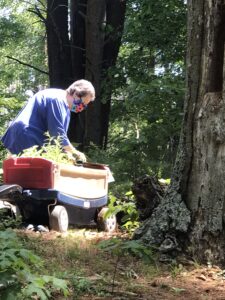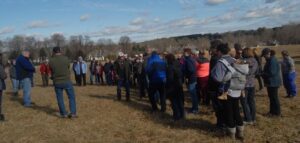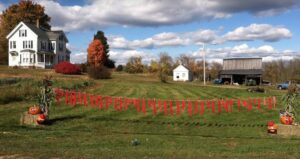A Love Letter to Open Space Committees
By Kate Sutcliffe
A Local Labor of Love
Prior to joining Mount Grace as a Regional Collaboration Coordinator, I was – I thought – relatively up-to-date on conversations happening in the conservation space. Given that I worked in government consulting I also – I thought – had a relatively good grasp of Massachusetts government. However, I’d never heard of Open Space Committees (OSC): the town committees usually composed heavily or entirely of volunteers that work to preserve and steward local open space and recreation opportunities.
However, I was forced to learn quickly, as one of my key capacity building projects for the year was planning the 2021 Open Space Conference. This is the only conference – and indeed, one of the only educational resources – in Massachusetts specifically curated for an audience of OSCs. While there are many resources for land trusts, Conservation Commissions, and other non-profits, OSCs are often left behind. Many towns don’t even have an OSC. Others form them only to write an Open Space and Recreation Plan in order to be eligible for grant money, only to have them dissolve again. Those that persist frequently do so because of the work of dedicated and passionate local citizens who care about conserving open space for the people in their town. They work with shoestring budgets, few resources, and are truly a labor of love. Yet the scope of their impact is extraordinary, particularly when held up with how little they have to work with.
Celebrating Stories of Community Land Stewardship

Since this year’s conference had to be an entirely virtual event, our planning committee wrote several case studies where OSCs shared projects they’d done to allow other towns to get inspired and emulate their work. For me, the work of getting to interview each of the OSCs was the most joyful part of planning the conference. I had expected quick, 15-minute conversations with an individual giving me the technical ins-and-outs of a project. Instead, on more than one interview, the entire OSC would show up, eager to share their story, sending as many pictures and resources as they had available so that others could learn. They bubbled over with joy and passion for the work they were doing to conserve and steward land at the local level. Some were planting pollinator gardens in forests; others were organizing river walks so that town people could discover new open spaces. One was working passionately to bring environmental education to elementary and middle schoolers. Some spent a year writing hundred-plus page plans to bring money into their towns and using the process to reflect on how to bring new voices into their conversations.
I distinctly remember one conversation I had with an OSC member who’d moved to his town only a year ago upon his retirement. He couldn’t stop talking about how much community he’d found in his new home; how the time he spent building trails let him meet so many new people; how beautiful and amazing he found this part of Massachusetts. Sadly, he passed away a week after our interview, but I will always be thankful I had the honor of meeting him. He demonstrated how to love the place you live – not only with the words you say, but through the actions of your hands.
Cultivating Networks of Community
Now that the conference is over, I can point to a lot of quantitative things we’re pleased about. We had more attendees than we’ve ever had before – we had many OSCs represented as speakers or through case study interviews – we launched initiatives like thinking about how parents with children could still make time to attend. What I am proudest of, though, is simply how bringing OSC members together in this space is a reminder, you are not alone in this work. There are others like you across the state dedicated to serving their communities. They might not often be recognized, their work may sometimes be thankless, but it’s through their dedication that so many of the places we cherish are there to cherish at all. We had so many people tell us they’d found new connections through this conference. Especially in the digital environment caused by the pandemic, simply realizing you’re not alone can be an incredibly empowering thing.
As I approach the end of my TerraCorps Service year, I offer this reflection as a love letter to Open Space Committees. Wherever I go after my time with TerraCorps ends, I will be shouting about OSCs from the rooftops. Wherever I live, I will ask everyone I meet: do you know about our OSC? Have you thought about volunteering with them? Share your community vision with your OSC. They want to hear it, and they want to help you implement it.
Many people speak of an ethos of public service, but I witness it as a full blossom in the space made by Open Space Committees.

Kate served as the Regional Collaboration Coordinator with Mount Grace Land Conservation Trust, North Quabbin Regional Landscape Partnership for TerraCorps 2020-2021.

